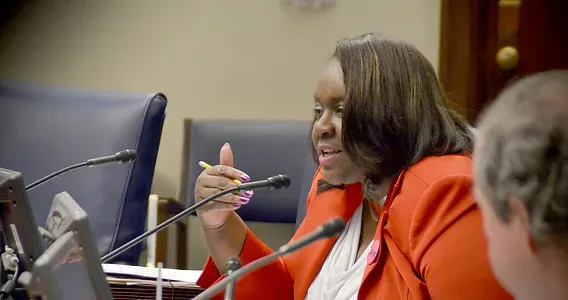Sen. Regina Barrow Pushes Back Against Proposal to Expand Adult Sentencing for Minors
During a Senate Judiciary C Committee hearing, Barrow cast the sole dissenting vote against Senate Bill 2, allowing lawmakers to broaden the crimes for which youth aged 14 to 16 could face adult prison sentences.

BATON ROUGE, La. — State Sen. Regina Barrow, D-Baton Rouge, emerged as the lone voice of opposition Thursday to a proposed constitutional amendment that could expand the ability to charge minors as adults in Louisiana’s criminal justice system.
During a Senate Judiciary C Committee hearing, Barrow cast the sole dissenting vote against Senate Bill 2, allowing lawmakers to broaden the crimes for which youth aged 14 to 16 could face adult prison sentences. The committee, dominated by Republicans, voted 4-1 to advance the measure, introduced by Sen. Heather Cloud, R-Turkey Creek.
Barrow expressed deep concerns about the amendment’s potential impact on Louisiana’s children, emphasizing the importance of rehabilitation over punitive measures. “I do not believe kids are born bad. I just don’t,” Barrow said during the hearing. “We need to focus on intervention and addressing the root causes of their behavior, not giving up on them.”
The proposed amendment would remove constitutional protections that currently limit the types of crimes for which minors can be tried as adults, such as murder, rape, and armed robbery. It would allow the Legislature to pass new laws expanding adult court eligibility for minors, pending a two-thirds vote in both chambers.
Barrow questioned the necessity of such a sweeping change, highlighting existing avenues for prosecuting serious juvenile offenses in adult court. Advocates, including the Louisiana Center for Children’s Rights, echoed her concerns, pointing out that crimes like armed robbery and murder can already lead to adult sentencing for youth under current law.
“This amendment is not about filling a gap in the law—it’s about increasing punishment at the expense of rehabilitation,” Barrow said.
Child advocates warned that the amendment risks exacerbating systemic issues within Louisiana’s juvenile justice system. “It’s a profound social failure when we give up on kids instead of addressing the underlying issues,” said Michael Cahoon of the Promise of Justice Initiative.
Barrow also pointed to the challenges already faced by law enforcement and corrections officials after the state passed a law earlier this year requiring 17-year-olds to be tried as adults. Sheriffs have reported difficulties complying with federal mandates to separate minors from adult detainees and provide educational services, citing insufficient space and resources.
A recent analysis of arrests in East Baton Rouge, Jefferson, and Orleans parishes revealed that nearly 70% of 17-year-olds charged as adults under the new law were accused of nonviolent crimes. Barrow cited this data as evidence that punitive approaches are not addressing the root causes of juvenile delinquency.
“The data shows we’re disproportionately punishing kids for nonviolent crimes, and this amendment would only expand that problem,” Barrow said.
Despite her efforts, the measure advanced out of committee and now faces a challenging path forward. It requires a two-thirds majority in both the House and Senate before being put to voters in a statewide election, potentially in March or November of 2025.
Barrow urged her colleagues to reconsider the amendment’s broader implications. “We need to invest in our youth and their futures, not in policies that strip them of hope and opportunity,” she said. “Our children deserve better.”






